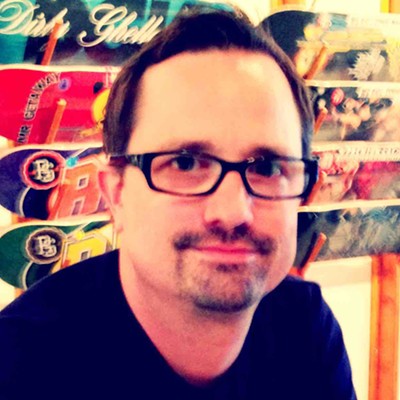Categorizing music is inevitable, even necessary in some cases, but the desire to describe a band using predetermined genres sometimes has the effect of creating more questions than answers. Such is the case with Modern Goon, a three-piece Denver band that includes two high-school English teachers and members of now-defunct groups from the area scene.
“Everyone wants to put stuff in a box,” says frontman Aaron Betcher, “but that box is pretty big. I feel like we have sensibilities where you hear some kind of melody, but [it’s] also like a train jumping the tracks.”
Modern Goon got its start after two other like-minded local bands — Drunken Arrows and Glass Hits — called it quits around the same time a little over a year ago. While Glass Hits worked the D.C. sound pretty well, Drunken Arrows went for a more in-your-face aesthetic.
“Drunken Arrows was intended to be like the Jesus Lizard — very confrontational,” says Betcher. “You’d leave thinking, ‘Well, I like it, but I kind of didn’t like it.’”
After the band’s breakup, he wanted to make music that was more approachable but still had enough edge to be interesting. He also had to squeeze it in around being a new dad.
“My wife was like, ‘I need you for six months,’” says Betcher. “I bargained it down to four or five.”
Betcher got together with Jose Piza, who’d played guitar in Glass Hits, and Dave Beckhouse, that band’s drummer, to form Modern Goon. (Piza now plays bass.) Practices were set, songs were written, and then…not much happened.
“At a certain point,” says Beckhouse, who is 45 years old, “the days of starting a band and playing shows in six weeks are over.”
The bandmembers got together when they could, but jobs and parenting took the lead in those early days. Betcher says having a new child was a lot of work initially, leaving little energy for music.
“We’d get together a few times, write some songs, then we wouldn’t practice for a few weeks, forget the songs, get together, write some more,” he recalls.
Eventually, being a dad got easier, and getting out for practice became less difficult.
“It ended up working just fine,” he says. “Now my wife is glad when I have band practice. She says, ‘You’re much happier when you’re playing music.’”
To be sure, Modern Goon is its own band, but it’s hard to deny that it has a lot in common with the previous bands of its members. Like Glass Hits and Drunken Arrows, Modern Goon borrows heavily from the overdriven, angular guitars and screamy but melodic vocals most often associated with the Washington, D.C., punk scene of the ’90s. Betcher says the band is like Fugazi and Jawbox, but also like non-East Coast groups such as Shellac. Personally, he says, he’s influenced as much by D.C.’s seminal proto-emo group Rights of Spring as he is San Diego bands like aMiniature and Drive Like Jehu. It’s obvious from the strong, straightforward bass and drums of Modern Goon that some less abrasive, rhythm-driven bands have had a strong influence as well.
“I’ve always enjoyed those bands that have an artful way of presenting music, but it’s aggressive at the same time,” notes Betcher. “The sexy label right now is ‘post-punk,’ and I think we have a good post-punk scene here. We’re really intentionally trying to break things up, to make people have an emotional response.”
Part of that, he says, was making the band’s sound familiar but also outstanding. From the beginning, Betcher tried to aim the entire setup toward making something extraordinary.
“Even picking out gear for this band, I was like, ‘I want to have gear that nobody else in town has,’” he says.
He settled on a grind fuzz pedal from Heavy Electronics and an old Peavey Festival amp head, an early version that eventually became the Mace head that Lynyrd Skynyrd used.
“What’s interesting about the Peavey stuff, it’s cheap and it’s pretending to be someone else,” he says. “I was trying to make something new and different, and I thought that would be a neat way to get to that. Jose’s still playing the same bass head he’s had since high school. He likes having some fuzz in there, so I’m like, ‘I’m gonna turn up the treble.’ With our whole sound, we’re trying to be a little beyond the pale.
“The fun thing is, I’m not going for anything,” he concludes. “I’m just getting up there and doing shit. It’s all over the place.”
[
{
"name": "Air - MediumRectangle - Inline Content - Mobile Display Size",
"component": "12017618",
"insertPoint": "2",
"requiredCountToDisplay": "2"
},{
"name": "Editor Picks",
"component": "17242653",
"insertPoint": "4",
"requiredCountToDisplay": "1"
},{
"name": "Inline Links",
"component": "18838239",
"insertPoint": "8th",
"startingPoint": 8,
"requiredCountToDisplay": "7",
"maxInsertions": 25
},{
"name": "Air - MediumRectangle - Combo - Inline Content",
"component": "17261320",
"insertPoint": "8th",
"startingPoint": 8,
"requiredCountToDisplay": "7",
"maxInsertions": 25
},{
"name": "Inline Links",
"component": "18838239",
"insertPoint": "8th",
"startingPoint": 12,
"requiredCountToDisplay": "11",
"maxInsertions": 25
},{
"name": "Air - Leaderboard Tower - Combo - Inline Content",
"component": "17261321",
"insertPoint": "8th",
"startingPoint": 12,
"requiredCountToDisplay": "11",
"maxInsertions": 25
}
]











